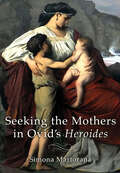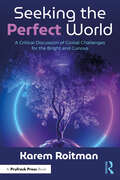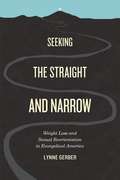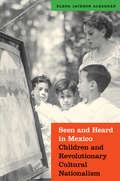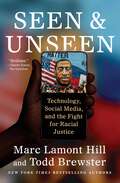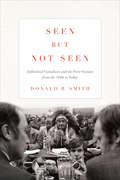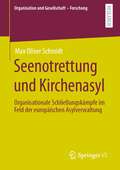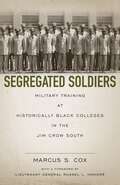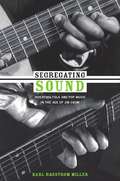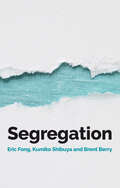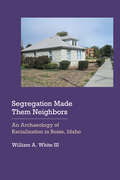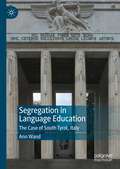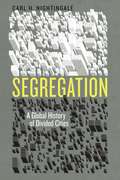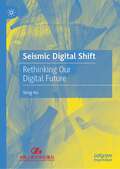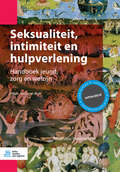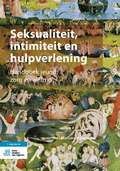- Table View
- List View
Seeking the Mothers in Ovid's "Heroides"
by Simona MartoranaSeeking the Mothers in Ovid's "Heroides" explores Ovid's reconceptualization of the heroines' maternal experience. Rather than aligning them with the stereotypical roles of Roman women, motherhood enables the Ovidian heroines to challenge traditional norms with irreverent perspectives on gender categories and familial relationships. To confront these perspectives and overcome the dialectic between the (male) voice of the poet and the (female) voice of the heroines, Seeking the Mothers in Ovid's "Heroides" argues for a form of polyphonic "cooperation" between the two voices, thus providing new angles on ironical discourse and gender fluidity within the Heroides.By reading the Heroides both through feminist theory and against Ovid's poetic production, Simona Martorana provides a novel approach to describe how motherhood enhances the heroines' agency, drawing on works of Kristeva, Irigaray, Butler, Mulvey, Cavarero, Braidotti, and Ettinger. The application of theory is flexible throughout Seeking the Mothers in Ovid's "Heroides" and tailored to the nuances of specific passages rather than being uniformly imposed on the ancient text.Seeking the Mothers in Ovid's "Heroides" reveals how the irony, ambiguity, and polyphony intrinsic to Ovid's poetry are amplified by the heroines' poetic voices. Martorana breaks new ground by incorporating contemporary feminist theories within the analysis of the Heroides and provides an original comprehensive analysis of motherhood that encompasses other Ovidian works, Latin poetry, and classical literature more broadly.
Seeking the Perfect World: A Critical Discussion of Global Challenges for the Bright and Curious
by Karem RoitmanConsider this book your invitation to the most exciting party of the century. We have invited you and some of the greatest minds of our species to dance, share cake, and ponder the age-old question: how can we make our world better? Seeking the Perfect World guides readers through thoughtful discussions of twenty-first-century challenges while providing everything needed to critically engage with current events and personal dilemmas.This book explores topics humans have discussed for centuries … and more recent developments. We discuss what is human nature, why humans go to war, international relations, education, animal rights, transhumanism, artificial intelligence, and more! Chapters introduce readers to different philosophies (and philosophers) and prompt nuanced reasoning via Socratic questions and thought experiments. Not only will this book enable readers to understand the complexities of some of the most pressing global challenges, but it will also provide a grounding on philosophical, sociological, and economic thinking and ideas.Whether you are dipping your toes into philosophy for the first time, or you are a bright, curious teen seeking interesting conversations on the current events and global challenges, or a parent seeking ways to discuss difficult topics with your child – this book will provide you with the language and strategies needed to understand your own views and feelings while engaging in civic discourse. Come chat with philosophers, challenge your critical thinking, and expand your understanding of our world: past, present, and future.
Seeking the Straight and Narrow: Weight Loss and Sexual Reorientation in Evangelical America
by Lynne GerberLosing weight and changing your sexual orientation are both notoriously difficult to do successfully. Yet many faithful evangelical Christians believe that thinness and heterosexuality are godly ideals—and that God will provide reliable paths toward them for those who fall short. Seeking the Straight and Narrow is a fascinating account of the world of evangelical efforts to alter our strongest bodily desires. Drawing on fieldwork at First Place, a popular Christian weight-loss program, and Exodus International, a network of ex-gay ministries, Lynne Gerber explores why some Christians feel that being fat or gay offends God, what exactly they do to lose weight or go straight, and how they make sense of the program’s results—or, frequently, their lack. Gerber notes the differences and striking parallels between the two programs, and, more broadly, she traces the ways that other social institutions have attempted to contain the excesses associated with fatness and homosexuality. Challenging narratives that place evangelicals in constant opposition to dominant American values, Gerber shows that these programs reflect the often overlooked connection between American cultural obsessions and Christian ones.
Seen and Heard in Mexico: Children and Revolutionary Cultural Nationalism (The Mexican Experience)
by Elena Jackson AlbarranDuring the first two decades following the Mexican Revolution, children in the country gained unprecedented consideration as viable cultural critics, social actors, and subjects of reform. Not only did they become central to the reform agenda of the revolutionary nationalist government; they were also the beneficiaries of the largest percentage of the national budget.While most historical accounts of postrevolutionary Mexico omit discussion of how children themselves experienced and perceived the sudden onslaught of resources and attention, Elena Jackson Albarrán, in Seen and Heard in Mexico, places children’s voices at the center of her analysis. Albarrán draws on archived records of children’s experiences in the form of letters, stories, scripts, drawings, interviews, presentations, and homework assignments to explore how Mexican childhood, despite the hopeful visions of revolutionary ideologues, was not a uniform experience set against the monolithic backdrop of cultural nationalism, but rather was varied and uneven. Moving children from the aesthetic to the political realm, Albarrán situates them in their rightful place at the center of Mexico’s revolutionary narrative by examining the avenues through which children contributed to ideas about citizenship and nation.
Seen and Unseen: Technology, Social Media, and the Fight for Racial Justice
by Todd Brewster Marc Lamont HillA riveting exploration of how the power of visual media over the last few years has shifted the narrative on race and reignited the push towards justice by the author of the &“worthy and necessary&” (The New York Times) Nobody Marc Lamont Hill and the bestselling author and acclaimed journalist Todd Brewster.With his signature &“clear and courageous&” (Cornel West) voice Marc Lamont Hill and New York Times bestselling author Todd Brewster weave four recent pivotal moments in America&’s racial divide into their disturbing historical context—starting with the killing of George Floyd—Seen and Unseen reveals the connections between our current news headlines and social media feeds and the country&’s long struggle against racism.For most of American history, our media has reinforced and promoted racism. But with the immediacy of modern technology—the ubiquity of smartphones, social media, and the internet—that long history is now in flux. From the teenager who caught George Floyd&’s killing on camera to the citizens who held prosecutors accountable for properly investigating the killing of Ahmaud Arbery, ordinary people are now able to reveal injustice in a more immediate way. As broad movements to overhaul policing, housing, and schooling gain new vitality, Seen and Unseen demonstrates that change starts with the raw evidence of those recording history on the front lines.In the vein of The New Jim Crow and Caste, Seen and Unseen incisively explores what connects our moment to the history of race in America but also what makes today different from the civil rights movements of the past and what it will ultimately take to push social justice forward.
Seen but Not Seen: Influential Canadians and the First Nations from the 1840s to Today
by Donald B. SmithThroughout the nineteenth and most of the twentieth century, the majority of Canadians argued that European "civilization" must replace Indigenous culture. The ultimate objective was assimilation into the dominant society. Seen but Not Seen explores the history of Indigenous marginalization and why non-Indigenous Canadians failed to recognize Indigenous societies and cultures as worthy of respect. Approaching the issue biographically, Donald B. Smith presents the commentaries of sixteen influential Canadians – including John A. Macdonald, George Grant, and Emily Carr – who spoke extensively on Indigenous subjects. Supported by documentary records spanning over nearly two centuries, Seen but Not Seen covers fresh ground in the history of settler-Indigenous relations.
Seen, Heard, and Paid: The New Work Rules for the Marginalized
by Alan HenryThe real tools for career success and work satisfaction for anyone feeling undermined or marginalized at their job, from a productivity expert and editor at Wired.&“Alan Henry doesn&’t just illuminate the invisible barriers that often stand in the way of success—he shines a light on what you can do to break through them.&”—Adam Grant, #1 New York Times bestselling author of Think Again and host of the TED podcast WorkLife For over twenty years, Alan Henry has written about using technology and productivity techniques to work and live better for publications such as Lifehacker, The New York Times, and Wired. But he found that as a Black man he didn&’t have access to some of the more powerful ways to hack your job—like only checking email once a day or blocking out time on your calendar to do deep work. In fact, he found that even when he landed a prestigious title at the Times, there were moments when he was still overlooked and excluded from the most interesting and career-boosting work. This led him to first explore these struggles in a Times piece titled &“Productivity Without Privilege.&” Now he goes even deeper, interviewing experts across multiple fields to come up with powerful tools to overcome the forces of marginalization. In Seen, Heard, and Paid, Henry shares the new work rules that may finally allow people of color, women, and LGBTQ+ folks to have the same access to career advancement and rewarding work as those with more privilege, including: How to Be Seen: Only spend time on work that gets you attention.How to Be Heard: Figure out your unique contribution. How to Get Paid: Data is power and power is money. Whether you&’re dealing with microaggressions, trying to get the glamour work instead of the office housework, weighing the pluses and minuses of working remotely, or deciding it&’s time to look for a new opportunity, Seen, Heard, and Paid will help you feel informed, supported, and empowered.
Seenotrettung und Kirchenasyl: Organisationale Schließungskämpfe im Feld der europäischen Asylverwaltung (Organisation und Gesellschaft - Forschung)
by Max Oliver SchmidtDer Zugang zu einem Asylverfahren in der EU ist ein umkämpftes soziales Gut. Die Studie zeichnet ein komplexes Bild von Ausschließungs- und Usurpationsstrategien im Feld der europäischen und speziell der italienischen und deutschen Asylverwaltung zwischen 2015 und 2018. (Supra-)nationale Verwaltungs- und Vollzugsorganisationen versuchen Flüchtende von dem Verwaltungsakt abzuhalten und entwickeln territoriale und administrative Exklusionsstrategien, um Fluchtmobilität und Asyl zu verwehren. Gleichzeitig erkämpfen Seenotrettungs- und Kirchenorganisationen den Zugang zum Asylverfahren, indem sie sich mit Flüchtenden solidarisieren und diesen eine Partizipation an öffentlichen Gütern und Rechten der Aufnahmegesellschaft ermöglichen.Für Flüchtende wird der formale Zugang zu und die temporäre Mitgliedschaft in einer Aufnahmegesellschaft in konfliktreichen und inter-organisationalen Entscheidungen ausgehandelt. Die formale Organisation wird zum Ort der Schließungskämpfe, indem sie als Schließungsakteur und zwischengesellschaftliches Schließungssystem formale Interaktionen zwischen Geflüchteten und Aufnahmegesellschaft ermöglicht oder verhindert. Die Synthese von schließungs- und organisationstheoretischen Perspektiven trägt dazu bei, dass gesellschaftliche Ordnungsbildung organisationssoziologisch erklärbar wird.
Segregated Miscegenation: On the Treatment of Racial Hybridity in the North American and Latin American Literary Traditions (Literary Criticism and Cultural Theory)
by Carlos HiraldoFirst Published in 2003. Routledge is an imprint of Taylor & Francis, an informa company.
Segregated Soldiers: Military Training at Historically Black Colleges in the Jim Crow South
by Marcus S. CoxIn Segregated Soldiers, Marcus S. Cox investigates military training programs at historically black colleges and universities, and demonstrates their importance to the struggle for civil rights. Examining African Americans' attitudes toward service in the armed forces, Cox focuses on the ways in which black higher education and Reserve Officer Training Corps (ROTC) programs worked together to advance full citizenship rights for African Americans. Educators at black colleges supported military training as early as the late nineteenth century in hopes of improving the social, economic, and political state of black citizens. Their attitudes reflected the long-held belief of many African Americans who viewed military service as a path to equal rights.Cox begins his narrative in the decades following the Civil War, when the movement to educate blacks became an essential element in the effort to offer equality to all African Americans. ROTC training emerged as a fundamental component of black higher education, as African American educators encouraged military activities to promote discipline, upright behavior, and patriotism. These virtues, they believed, would hasten African Americans' quest for civil rights and social progress. Using Southern University -- one of the largest African American institutions of higher learning during the post--World War II era -- as a case study, Cox shows how blacks' interest in military training and service continued to rise steadily throughout the 1950s. Even in the 1960s and early 1970s, despite the growing unpopularity of the Vietnam War, the rise of black nationalism, and an expanding economy that offered African Americans enhanced economic opportunities, support for the military persisted among blacks because many believed that service in the armed forces represented the best way to advance themselves in a society in which racial discrimination flourished. Unlike recent scholarship on historically black colleges and universities, Cox's study moves beyond institutional histories to provide a detailed examination of broader social, political, and economic issues, and demonstrates why military training programs remained a vital part of the schools' missions.
Segregating Sound: Inventing Folk and Pop Music in the Age of Jim Crow
by Karl Hagstrom MillerIn Segregating Sound, Karl Hagstrom Miller argues that the categories that we have inherited to think and talk about southern music bear little relation to the ways that southerners long played and heard music. Focusing on the late nineteenth century and the early twentieth, Miller chronicles how southern music--a fluid complex of sounds and styles in practice--was reduced to a series of distinct genres linked to particular racial and ethnic identities. The blues were African American. Rural white southerners played country music. By the 1920s, these depictions were touted in folk song collections and the catalogs of "race" and "hillbilly" records produced by the phonograph industry. Such links among race, region, and music were new. Black and white artists alike had played not only blues, ballads, ragtime, and string band music, but also nationally popular sentimental ballads, minstrel songs, Tin Pan Alley tunes, and Broadway hits. In a cultural history filled with musicians, listeners, scholars, and business people, Miller describes how folklore studies and the music industry helped to create a "musical color line," a cultural parallel to the physical color line that came to define the Jim Crow South. Segregated sound emerged slowly through the interactions of southern and northern musicians, record companies that sought to penetrate new markets across the South and the globe, and academic folklorists who attempted to tap southern music for evidence about the history of human civilization. Contending that people's musical worlds were defined less by who they were than by the music that they heard, Miller challenges assumptions about the relation of race, music, and the market.
Segregation
by Eric Fong Brent Berry Kumiko ShibuyaSegregation is one of the starkest social realities of contemporary societies. Though often associated with explicitly racist laws of the past, it is a phenomenon that persists to this day and is a crucial element for understanding group relations and the wellbeing of different populations in society. In this book, Eric Fong and Kumiko Shibuya provide a thorough discussion of the evolving complexity of segregation in all its variety and variations. The authors focus not only on past trends and the development of segregation measures, but also the current state of affairs, and demonstrate the connections between the segregation of racial/ethnic groups, immigrant communities, and schools, along with poverty concentration. By taking a wide, cross-cutting view, the authors identify commonalities and differences in the causes, mechanisms, and consequences of segregation. Spatial and social segregation together perpetuate and reinforce the unequal distribution of resources among racial and ethnic groups, which in turn can have positive and negative consequences for individuals and groups. This critical overview of segregation will be a valuable and insightful resource for students of sociology, geography, and ethnic studies, as well as those keen to get a handle on this persistent challenge to equal and inclusive societies.
Segregation Made Them Neighbors: An Archaeology of Racialization in Boise, Idaho (Historical Archaeology of the American West)
by William A. White IIISegregation Made Them Neighbors investigates the relationship between whiteness and nonwhiteness through the lenses of landscapes and material culture. William A. White III uses data collected from a public archaeology and digital humanities project conducted in the River Street neighborhood in Boise, Idaho, to investigate the mechanisms used to divide local populations into racial categories. The River Street Neighborhood was a multiracial, multiethnic enclave in Boise that was inhabited by African American, European American, and Basque residents. Building on theoretical concepts from whiteness studies and critical race theory, this volume also explores the ways Boise&’s residents crafted segregated landscapes between the 1890s and 1960s to establish white and nonwhite geographies. White describes how housing, urban infrastructure, ethnicity, race, and employment served to delineate the River Street neighborhood into a nonwhite space, an activity that resulted in larger repercussions for other Boiseans. Using material culture excavated from the neighborhood, White describes how residents used mass-produced products to assert their humanity and subvert racial memes. By describing the effects of racial discrimination, real-estate redlining, and urban renewal on the preservation of historic properties in the River Street neighborhood, Segregation Made Them Neighbors illustrates the symbiotic mechanisms that also prevent equity and representation through historic preservation in other cities in the American West.
Segregation in Language Education: The Case of South Tyrol, Italy
by Ann WandThis book sets out to try to understand why segregated schooling still exists, especially in northern Italy in South Tyrol where they practice ‘separate but equal’ education. Supported by the UN, the Austrian and Italian governments, the province is considered a ‘peace model’ due to its consociational approach to dealing with the region’s Nazi and Fascist past, which has led to a ‘negative peace’. The autonomy statutes, which derived from this ‘peace’, resulted in an education system that is linguistically segregated for the purposes of protecting South Tyrol’s ethnolinguistic minorities. Broken into two parts, the book begins with the background history of the province, before describing the region’s geographical layout, demographics, local identity, and its three-part schooling system. By examining responses to South Tyrol’s education system, and its impact on local group dynamics, this book explores the implications that segregated schooling may have on second language acquisition. This case study will be of interest to students and scholars of Italian studies, anthropology, linguistic ethnography, sociolinguistics, and second language education.
Segregation: A Global History of Divided Cities
by Carl H. NightingaleWhen we think of segregation, what often comes to mind is apartheid South Africa, or the American South in the age of Jim Crow—two societies fundamentally premised on the concept of the separation of the races. But as Carl H. Nightingale shows us in this magisterial history, segregation is everywhere, deforming cities and societies worldwide. Starting with segregation’s ancient roots, and what the archaeological evidence reveals about humanity’s long-standing use of urban divisions to reinforce political and economic inequality, Nightingale then moves to the world of European colonialism. It was there, he shows, segregation based on color—and eventually on race—took hold; the British East India Company, for example, split Calcutta into “White Town” and “Black Town. ” As we follow Nightingale’s story around the globe, we see that division replicated from Hong Kong to Nairobi, Baltimore to San Francisco, and more. The turn of the twentieth century saw the most aggressive segregation movements yet, as white communities almost everywhere set to rearranging whole cities along racial lines. Nightingale focuses closely on two striking examples: Johannesburg, with its state-sponsored separation, and Chicago, in which the goal of segregation was advanced by the more subtle methods of real estate markets and housing policy. For the first time ever, the majority of humans live in cities, and nearly all those cities bear the scars of segregation. This unprecedented, ambitious history lays bare our troubled past, and sets us on the path to imagining the better, more equal cities of the future.
Sehbeeinträchtigung im Alter: Alltagserleben, Rehabilitation und Motivation (Blinden- und Sehbehindertenpädagogik im Kontext Lebenslangen Lernens)
by Sabine Lauber-Pohle Alexander SeifertSehbeeinträchtigungen im Alter zu erfahren, gehört für zunehmend mehr Menschen zu einer herausfordernden Alltagssituation. Das Buch nimmt sich dieser Lebenssituation der Seniorinnen und Senioren an und diskutiert anhand von theoretischen, empirischen und praxisevaluierenden Beiträgen die Vielfalt der sinnesbeeinträchtigenden Herausforderung im Alltag der älteren Menschen. Mit dem Buch präsentieren Expertinnen und Experten aus dem deutschsprachigen Raum ihre Forschungsergebnisse und beschreiben ihre Beratungsprojekte. Sie liefern so einen Fundus für die praktische Arbeit mit älteren Menschen.
Seinfeldia: How a Show About Nothing Changed Everything
by Jennifer Keishin Armstrong"Her book, as if she were a marine biologist, is a deep dive...Perhaps the highest praise I can give Seinfeldia is that it made me want to buy a loaf of marbled rye and start watching again, from the beginning." --Dwight Garner, The New York Times Book Review The hilarious behind-the-scenes story of two guys who went out for coffee and dreamed up Seinfeld--the cultural sensation that changed television and bled into the real world, altering the lives of everyone it touched.Comedians Larry David and Jerry Seinfeld never thought anyone would watch their silly little sitcom about a New York comedian sitting around talking to his friends. NBC executives didn't think anyone would watch either, but they bought it anyway, hiding it away in the TV dead zone of summer. But against all odds, viewers began to watch, first a few and then many, until nine years later nearly forty million Americans were tuning in weekly. In Seinfeldia, acclaimed TV historian and entertainment writer Jennifer Keishin Armstrong celebrates the creators and fans of this American television phenomenon, bringing readers behind-the-scenes of the show while it was on the air and into the world of devotees for whom it never stopped being relevant, a world where the Soup Nazi still spends his days saying "No soup for you!", Joe Davola gets questioned every day about his sanity, Kenny Kramer makes his living giving tours of New York sights from the show, and fans dress up in Jerry's famous puffy shirt, dance like Elaine, and imagine plotlines for Seinfeld if it were still on TV.
Seismic Digital Shift: Rethinking Our Digital Future
by Yong HuThis book is an in-depth study on the past, present and future of digitalization, an important contribution to the literature on the development of the digital economy in China. The technological revolution in telecommunications has brought a “seismic shift” - the periphery has moved to the center, accelerating the emergence of a new digital world. The adoption and integration of advanced digital technologies such as 5G mobile networks, the Internet of things (IoT), cloud computing, artificial intelligence, big data analysis and robotics means that the traditional economy, with its organizational, productive and governance systems, is merging with the digital economy, with its innovative features in terms of business models, production, business organization and governance. This makes the digital transformation process highly dynamic and complex, thus challenging many aspects of economies and societies. The author discusses not only what digital transformation means for businesses, but also its impact on society at large, inspiring readers to understand China and the world and think about what digital future we would like to have.
Seismic Isolation, Energy Dissipation and Active Vibration Control of Structures: 17th World Conference on Seismic Isolation (17WCSI) (Lecture Notes in Civil Engineering #309)
by Gian Paolo CimellaroThis volume gathers the proceedings of the 17th World Conference on Seismic Isolation (17WCSI), held in Turin, Italy on September 11-15, 2022. Endorsed by ASSISi Association (Anti-Seismic Systems International Society), the conference discussed state-of-the-art information as well as emerging concepts and innovative applications related to seismic isolation, energy dissipation and active vibration control of structures, resilience and sustainability. The volume covers highly diverse topics, including earthquake-resistant construction, protection from natural and man-made impacts, safety of structures, vulnerability, international standards on structures with seismic isolation, seismic isolation in existing structures and cultural heritage, seismic isolation in high rise buildings, seismic protection of non-structural elements, equipment and statues. The contributions, which are published after a rigorous international peer-review process, highlight numerous exciting ideas that will spur novel research directions and foster multidisciplinary collaboration among different specialists.
Seismic Isolation, Energy Dissipation and Active Vibration Control of Structures: 18th World Conference on Seismic Isolation (18WCSI) - Volume 1 (Lecture Notes in Civil Engineering #533)
by Mustafa Erdik Bahadir Sadan Cuneyt TuzunThis book gathers the proceedings of the 18th World Conference on Seismic Isolation (18WCSI), held in Antalya, Turkey, on November 6-10, 2023. Organized by Turkish Association for Seismic Isolation (TASI) and endorsed by Anti-Seismic Systems International Society (ASSISi Association), the conference discussed state-of-the-art information as well as emerging concepts and innovative applications related to seismic isolation, energy dissipation, and active vibration control of structures, resilience, and sustainability. The book covers highly diverse topics, including earthquake-resistant construction, protection from natural and man-made impacts, safety of structures, vulnerability, international standards on structures with seismic isolation, seismic isolation in existing structures and cultural heritage, seismic isolation in high-rise buildings, and seismic protection of non-structural elements, equipment, and statues.
Seismic Isolation, Energy Dissipation and Active Vibration Control of Structures: 18th World Conference on Seismic Isolation (18WCSI) - Volume 2 (Lecture Notes in Civil Engineering #412)
by Cem Yenidogan Ani Natali Sigaher Fatih SutcuThis book gathers proceedings of the 18th World Conference on Seismic Isolation (18WCSI), held in Antalya, Türkiye on November 6-10, 2023. Organized by the Turkish Association for Seismic Isolation (TASI) and endorsed by the Anti-Seismic Systems International Society (ASSISi), the conference discussed state-of-the-art information, as well as emerging concepts and innovative applications related to seismic isolation, energy dissipation, and active vibration control of structures, and resilience and sustainability. The volume covers highly diverse topics centered around energy dissipation devices. Chapters have been dedicated to the design and testing of energy dissipation devices, and the use of these devices in the design of structures, and retrofit of existing structures and cultural heritage. The contributions, which are published after a rigorous international peer-review process, highlight numerous exciting ideas that will spur novel research directions and foster multidisciplinary collaboration among different specialists.
Seksualiteit, intimiteit en hulpverlening: Handboek jeugd, zorg en welzijn
by Mathieu HeemelaarWerkers in de hulpverlening, dienstverlening en verpleging hebben op veel manieren te maken met seksualiteit en intimiteit. Veel cli#65533;nten kampen met problemen op het seksuele vlak, die vaak niet onderkend worden. Seksueel misbruik blijkt hoog in de hulpverlening. De grenzen in de intieme omgang tussen hulpverlener en cli#65533;nt zijn onderwerp van gesprek in instellingen en opleidingen. Dit boek biedt de basisinformatie over seksualiteit en intimiteit, die bekend moet worden verondersteld voor een professionele omgang met cli#65533;nten. Professioneel optreden stoelt ook hier op twee zaken: kennis van zaken en de vaardigheid om te praten over seksualiteit. Seksualiteit, intimiteit en hulpverlening bundelt actuele kennis uit de vakliteratuur over seksuele ontwikkeling, verstoringen in seksuele ontwikkeling, intimiteit, seksuele en relationele vorming, seksueel misbruik, preventie van misbruik en methodisch werken. Het boek bevat communicatietraining die studenten en hulpverleners door middel van studietaken en praktijkvoorbeelden aanzet tot reflectie en gesprek. Mathieu Heemelaar geeft naast een aanzienlijke hoeveelheid weetstof ook een groot aantal voorzetten en handreikingen, op weg naar een intiem klimaat, dat bescherming biedt, maar dat ook doorzichtig is. Dat is moedig en baanbrekend. Frits Wafelbakker in het voorwoord.
Seksualiteit, intimiteit en hulpverlening: Handboek jeugd, zorg en welzijn
by Mathieu HeemelaarDit boek is al 25 jaar hét handboek over seksualiteit, intimiteit en hulpverlening. Het bevat actuele informatie over seksuele ontwikkeling en seksuele gezondheid in alle levensfases, bij alle doelgroepen in de hulpverlening en bij elke seksuele gerichtheid en genderidenteit. Het is een basis voor de professionele omgang met cliënten, en helpt hulpverleners om hun beroepshouding verder te ontwikkelen. Het boek richt zich primair op hbo-studenten sociaal werk, pedagogiek, verpleegkunde en toegepaste psychologie, en op professionals in Gezondheidszorg, Jeugdwerk en het Welzijnswerk. Deze zesde druk van Seksualiteit, intimiteit en hulpverlening - Handboek jeugd, zorg en welzijn is compacter dan zijn voorgangers. Zo blijft het boek leesbaar en betaalbaar. Tegelijk bevat het door uitbreiding van de ondersteunende website wél fors meer informatie, omdat het op tal van punten is aangevuld en herzien. Het boek biedt materiaal waarmee de lezer leert om handelingsverlegenheid te overwinnen, te praten over seksualiteit, en te reflecteren op eigen normen en waarden. Ook bevat het verhelderende, kleurrijke illustraties van Marco Swaen. Seksueel grensoverschrijdend gedrag is een groot probleem. In dit boek worden de nieuwste inzichten in effectieve, sekspositieve preventie weergegeven. Studenten en daarmee hun cliënten leren met dit boek hoe je beter communiceert over gewenste seks. De zesde druk van het boek is opgedragen aan Ellen Laan, hoogleraar seksuologie, die helaas begin 2022 is overleden. Zij heeft baanbrekend onderzoek verricht naar vrouwelijke seksualiteitsbeleving. Haar inzichten hebben een prominente plaats gekregen in deze druk.Mathieu Heemelaar was hogeschooldocent seksualiteit aan de opleidingen Sociaal Werk, Pedagogiek en Pabo van De Haagse Hogeschool. Tijdens zijn pensioen blijft hij actief als adviseur seksualiteitsonderwijs.
Selbst im Alltag: Qualitative Sekundäranalysen zu Identitätskonstruktionen im Wechselverhältnis von Normierung und Selbstentwurf
by Thomas Kühn Sabine Beckmann Patrick Ehnis Marina Mohr Katrin VoigtMithilfe von Sekundäranalysen qualitativer Interviews – geführt zwischen Ende der 1980er und Anfang der 2000er Jahre – analysieren die Autor*innen, wie sich gesellschaftliche Prozesse in der Arbeitswelt, im Geschlechterverhältnis sowie Einflüssen von Individualisierung, Aktivierung und Selbstoptimierung in der Konstruktion des Selbst niedergeschlagen. Erzählungen über Arbeit, Beziehung und Lebensführung verbinden die Autor*innen mit soziologischen und sozialpsychologischen Ansätzen zu Identitäts- und Subjektkonstruktionen. Dabei zeigen sie, wie der Kampf um Anerkennung, Autonomie und Authentizität, wie Zeitnutzungsdiskurse sowie Männlichkeits- und Weiblichkeitskonstruktionen das Alltagsleben und Lebensentscheidungen formen – stets im Spannungsfeld zwischen Unterordnung und Selbstermächtigung. Kritisch wird untersucht, wie Identitäts- und Subjektkonstruktionen mit der (Re)Produktion und (De)Legitimation sozialer Ungleichheitsverhältnisse zusammenhängen.
Selbstbestimmung oder Geschlechtergerechtigkeit
by Karin B. SchnebelSelbstbestimmung und Gerechtigkeit sind zwar allgemeine Wertvorstellungen, die jedoch in Konflikt zueinander geraten können. Auch das Ziel einer geschlechtergerechten Gesellschaft berührt dieses Spannungsfeld, da die Strategie gescheitert ist, Geschlechtergerechtigkeit über eine Ausblendung geschlechtlicher Unterschiede zu erreichen. Zwar ist es gelungen, Frauen stärker in der öffentlichen Sphäre zu verankern, doch kann ihre zivilisationsgeschichtlich starke Einbindung in das Private nicht übergangen werden. Die andere denkbare Möglichkeit Geschlechtergerechtigkeit herzustellen, ist die Anerkennung und Aufwertung der privaten, weiblich dominierten Sphäre. Hier wird gezeigt, dass eine Aufwertung des Privaten nur über eine stärkere Einmischung des Öffentlichen, also der Politik, in das Private geschehen kann, was zu einem Verlust von Autonomie führt. Es wird herausgearbeitet, dass die derzeitige Politik dabei ist, Frauen wieder stärker zu diskriminieren. Damit stellt sich die Frage: Wie kann ein liberaler Staat Geschlechtergerechtigkeit erreichen, ohne Werte wie Freiheit, Autonomie oder Selbstbestimmung zu gefährden?
